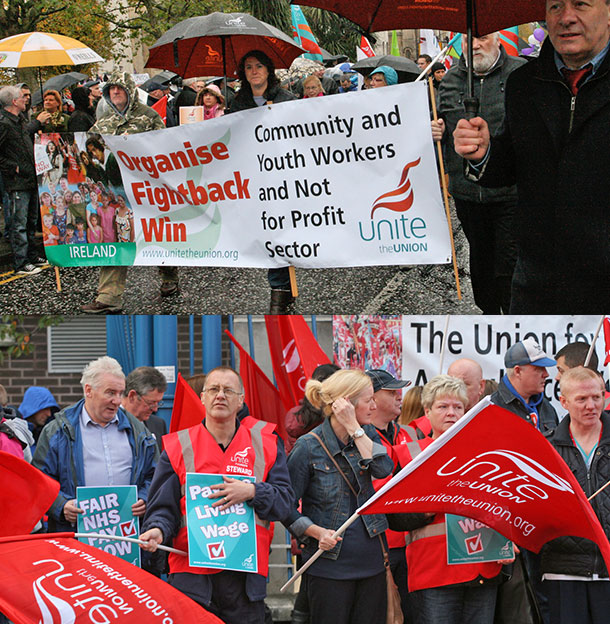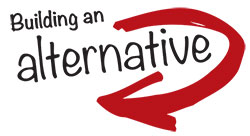2 November 2014 Edition
Tough decisions – By Peter Bunting, Irish Congress of Trade Unions Assistant General Secretary
Building an Alternative

• ICTU protest in defence of workers’ rights and against Tory welfare cuts
You tend not to see toughness being applied upwards. Reform is for the little people. The perks of the poor are luxuries which cannot be afforded
SAMMY WILSON was on the radio again, talking about tough decisions. Sinn Féin’s Mitchel McLaughlin did not deserve to be the Speaker of the Assembly because his party was ‘incapable of taking tough decisions on welfare reform’. The DUP, on the other hand, could take tough decisions. That is why they were taking the tough decision to renege on an agreement about which MLA would replace the DUP’s Willie Hay as Speaker.
You tend not to see toughness being applied upwards. You don’t hear calls for Corporation Tax to be raised by 50% to the level it was at in the boom year of 2006; you hear calls for it to be halved again to the tax haven levels of Dublin.
You don’t hear calls for EU-wide actions to prevent firms like JTI Gallaher shifting to cheaper labour markets in Romania; you hear demands that the EU scraps the Tobacco Directive.
Reform is for the little people. The perks of the poor are luxuries which cannot be afforded.
There is an argument that what we have in Stormont right now is an outbreak of politics and that, between now and the general election of May 2015 (perhaps even until the Assembly elections due in 2016), the main item on the agenda is not one which is rigidly sectarian but about economics.
There is a real ideological cleavage opening in Stormont, with the DUP and most (but not all) unionists and the Alliance Party applying what could be called a direct rule mentality. Their excuse is that if the Assembly strays too far from the path of Tory rectitude, the Treasury will sanction us, fine us and then offer us a loan to be paid off next year’s allowance. This is a cross between paternalist patron and Mafia loanshark. It makes a mockery of devolution and a display of just how lopsided is Stormont’s relationship with Westminster.

We are facing the same dilemmas as the Scots as they consider their place post-referendum, but also the Welsh and the regions of the north of England – the shifting of wealth and power to London.
“Any halfway serious investigation of the relationships between our nations and regions will end up showing how much of Britain’s business model is built on taking wealth and power from across the country and handing it to a small cabal of financiers and businesspeople in central London,” wrote the Guardian’s Aditya Chakrabortty.
Money is being sucked into London and the offshore accounts of the super-rich faster than The Sunday Times Rich List can keep up.
Democracy in Britain is becoming as distorted by corporate cash as it is in the US. Take the Lobbying Act, passed this year after another scandal involving lobbying MPs and peers with chequebooks and directorships. The finished Act ignores this legalised bribery and instead is an attempt to regulate into neutrality trade unions and charities who dare speak out against the enforced consensus of neoliberalism.
We in the trade union movement have no intention of shutting up.
Our members are under attack, as is the concept of a decent and equitable society fit for its citizens. It is for our members that we raise our voices and take to the streets, not for or against the electoral fortunes of any political party. But when we see a party supporting policies that are wrong or dangerous, we will object and we will support those politicans who do the right thing. On welfare reform, that means hailing the stance taken by Sinn Féin, the SDLP, the Green Party and especially Michael Copeland of the Ulster Unionist Party.
It also means that when our ‘traditional’ friends make errors (such as Labour Shadow Secretary of State Ivan Lewis MP when he tried to sound ‘tough’ on welfare reform), we point that out to them.
We oppose welfare reform not along sectarian lines but because we believe that a comprehensive system that protects the vulnerable and the prosperous, from the cradle to the grave, is a core value of our movement, one that unites the creeds and classes.
We look forward to further and more productive discussions with Ivan Lewis, as with all political leaders. We even look forward to our next meeting with Sammy Wilson, the DUP’s point-man for point-scoring on Radio Ulster’s The Nolan Show. We might remind him that when all was well with the parties in the Executive, back in January 2012, he told The Irish News that the trade unions should “shut up” with “scaremongering” figures of almost 26,000 job losses across the public sector between now and 2017. The then Minister for Finance stated that the unions “haven’t a clue where it is coming from”. We responded in detail at the time but can now speak with hindsight. We were right then and we are right now about welfare reform.
The point of making a tough decision is that it can hurt. Martin McGuinness made a tough decision when he met the Queen. Ian Paisley made a tough decision when he shared power with Martin McGuinness. As for those politicians in Stormont being tough for the marginalised and the vulnerable we say this – hang tough.
Peter Bunting is Assistant General Secretary Irish Congress of Trade Unions



